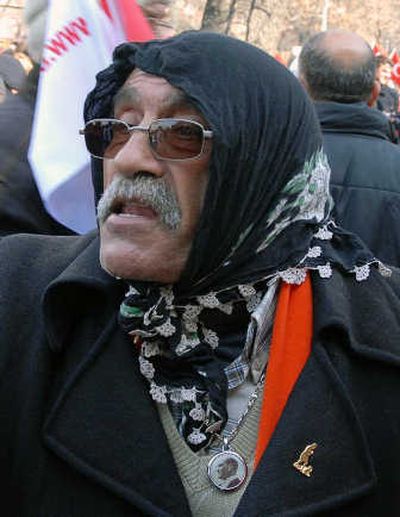Turks end ban on head scarves at universities

ISTANBUL, Turkey – Turkey’s parliament voted Saturday to end a more than 80-year-old ban on women wearing head scarves at universities, acknowledging the rising influence of conservative Islam in the most determinedly secular republic of the Muslim world.
Tens of thousands of secular Turks marched in the capital, Ankara, against lifting the ban. Many brandished portraits of Mustafa Kemal Ataturk, who founded modern Turkey in 1923 with the goal of making it a Westernized, secular republic.
“Turkey is secular and will remain secular,” the protesters chanted, swinging poles bearing the red flag of the Turkish republic.
“This is catastrophic,” Aylin Tok, a woman with uncovered hair, said in a busy shopping district in Istanbul, Turkey’s commercial center. “We are in a minority now,” she said, referring to Turkish women who do not cover their hair.
Ataturk, still revered even by many conservative Muslims, outlawed the wearing of Islamic attire at universities and in public offices.
The ban stood until Saturday’s vote by lawmakers. The governing Justice and Development Party, which is religiously conservative but has won wide support through pragmatic economic policies, holds a majority in parliament. It easily won passage of lifting the ban in a 411 to 103 vote.
Crucially, Turkey’s military made no immediate objection to the result. Turks long have regarded generals as the guardians of Ataturk’s secular vision for their country. In the past, generals have overthrown Islamic-oriented elected governments they saw as straying from his secular goal.
Last year, generals forced an early national election simply by posting a statement on a military Web site expressing their concern about the rise of the Justice and Development Party. But voters rebuked the generals, making clear in the resulting elections last year that they were increasingly comfortable with conservative Islam and pleased with the party’s economic policies.
The government news agency stressed that the style of head scarf legalized Saturday was not necessarily Islamic.
Justice and Development Party officials have promised to interpret the measure as allowing only head scarves that are tied under the chin, a style seen as traditionally Turkish rather than Islamic. The party says it will not allow women to wear more rigidly Islamic attire – veils that cover all of the hair and neck or the face, or cloaks that cover the body – in public offices.
The wife of Turkish President Abdullah Gul, also a member of the Justice and Development Party, had sued to be allowed to wear a head scarf in public institutions.
Saturday’s vote was a victory for the Islamic-based party. “Everyone must respect the national will as it is manifested in parliament,” Prime Minister Recep Tayyip Erdogan told reporters in Munich, where he was attending a security conference.
Opposition parties promised lawsuits to block the measure.